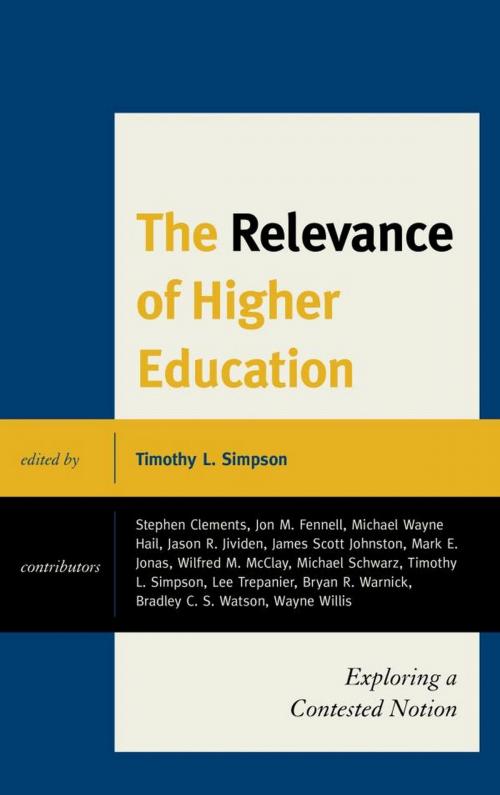The Relevance of Higher Education
Exploring a Contested Notion
Nonfiction, Reference & Language, Education & Teaching, Educational Theory, Aims & Objectives, Educational Reform| Author: | Lee Trepanier, Stephen Clements, Michael Schwartz, Jason R. Jividen, Michael Wayne Hail, Jon M. Fennell, Wayne Willis, Mark Jonas, Bradley C.S. Watson, Wilfred M. McClay, James Scott Johnston, Bryan R. Warnick | ISBN: | 9780739182536 |
| Publisher: | Lexington Books | Publication: | September 24, 2013 |
| Imprint: | Lexington Books | Language: | English |
| Author: | Lee Trepanier, Stephen Clements, Michael Schwartz, Jason R. Jividen, Michael Wayne Hail, Jon M. Fennell, Wayne Willis, Mark Jonas, Bradley C.S. Watson, Wilfred M. McClay, James Scott Johnston, Bryan R. Warnick |
| ISBN: | 9780739182536 |
| Publisher: | Lexington Books |
| Publication: | September 24, 2013 |
| Imprint: | Lexington Books |
| Language: | English |
Most statements today about higher education begin with the assumption that it should be relevant. That it should be relevant, however, does not settle the matter. The significance of relevance depends on the power of something else that is more fundamental. Relevance may be a true standard of judgment, but it does not stand by itself. Assuming higher education should be relevant, the question emerges, relevant to what? Why? How? At what costs? And, relevant in what sense? These are some of the central questions animating this study.
The Relevance of Higher Education: Exploring a Contested Notion, edited by Timothy L. Simpson examines the relevance of higher education by bringing together the work of historians, political scientists, and educational philosophers. The contributors probe the meaning of relevance in its many guises, providing an historical and philosophical account of the roots of this concept and its impact on the institution of higher education. Furthermore, The Relevance of Higher Education provides a critical evaluation of the impact of relevance on our understanding of the political and economic relationship between higher education and society. This study suggests views of relevance that could guide the future of higher education. By providing penetrating analysis, this text thoroughly explores relevance and its underlying assumptions, potential implications and long-lasting effects on higher education and society. The Relevance of Higher Education provides the tools necessary to develop a rich framework for understanding relevance and its impact on higher education and society.
Most statements today about higher education begin with the assumption that it should be relevant. That it should be relevant, however, does not settle the matter. The significance of relevance depends on the power of something else that is more fundamental. Relevance may be a true standard of judgment, but it does not stand by itself. Assuming higher education should be relevant, the question emerges, relevant to what? Why? How? At what costs? And, relevant in what sense? These are some of the central questions animating this study.
The Relevance of Higher Education: Exploring a Contested Notion, edited by Timothy L. Simpson examines the relevance of higher education by bringing together the work of historians, political scientists, and educational philosophers. The contributors probe the meaning of relevance in its many guises, providing an historical and philosophical account of the roots of this concept and its impact on the institution of higher education. Furthermore, The Relevance of Higher Education provides a critical evaluation of the impact of relevance on our understanding of the political and economic relationship between higher education and society. This study suggests views of relevance that could guide the future of higher education. By providing penetrating analysis, this text thoroughly explores relevance and its underlying assumptions, potential implications and long-lasting effects on higher education and society. The Relevance of Higher Education provides the tools necessary to develop a rich framework for understanding relevance and its impact on higher education and society.















